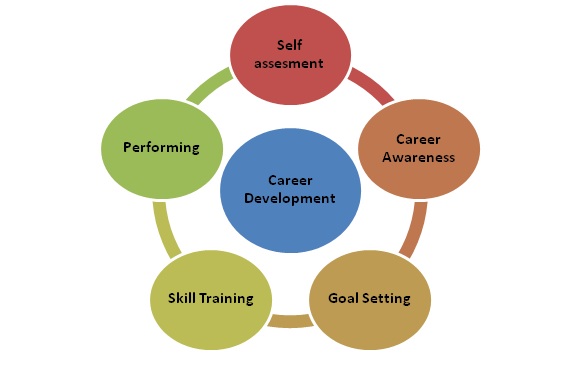- Business Concepts ›
- Human Resources (HR) ›
- Career Development
Career Development
Definition, Importance, Steps & Example
This article covers meaning & overview of Career Development from HRM perspective.
What is meant by Career Development?
Career development is the series of activities in an on-going/lifelong process of developing one’s career which includes defining new goals regularly and acquiring skills to achieve them. Career development usually refers to managing one’s career in an intra-organizational or inter-organizational scenario. It involves training on new skills, moving to higher job responsibilities, making a career change within the same organization, moving to a different organization or starting one’s own business.
Career development is directly linked to the goals and objectives set by an individual. It starts with self-actualization and self-assessment of one’s interests and capabilities. The interests are then matched with the available options.
The individual needs to train himself to acquire the skills needed for the option or career path chosen by him. Finally, after acquiring the desired competency, he has to perform to achieve the goals and targets set by him.
Career development is directly linked to an individual’s growth and satisfaction and hence should be managed by the individual and not left to the employer. Career development helps an individual grow not only professionally but also personally. Learning new skills like leadership, time management, good governance, communication management, team management etc. also help an employee develop and shape their career.

5 Steps of Career Development
There are various steps or stages in a person's overall career development:
1. Self Assessment
The first step in career development is the self assessment which means that the individual has to assess oneself on the kind of career and growth one wants and what kind of skills and interests are there.
2. Career Awareness
This stage is when an individual explores various career paths which align with the self assessment done in the first step. Career awareness can be how a person can explore various domains and types of jobs/work available
3. Goal Setting
This is the most important step in career development because this is where one defines clear short term and long term goals to meet the career one aspires. Both short term and long term goals need to be defined to begin with.
Short team goals would be more actionable but long term goals can be changed or tweaked as per the growth.
4. Skill Training
Once the career and goals are set, one needs to acquire the right skills to achieve the growth. Skill training can be done through self training or joining a structured training program online or offline.
Once the right skills are acquired, one can start the final stage.
5. Performing
With all the right knowledge and skills, the important part is to perform the tasks and jobs in the career successfully to grow in the career path.
The 5 steps are part of an ongoing process. Many times in a career, the person would need to revisit the cycle to get the right career growth.
Importance of Career Development
Every employee working in an organization is looking for a career development which moves in the right direction. Career path taken by an employee determines the growth. Career should be planned in a way that it moves forward.
Career development provides the framework with skills, goals, awareness, assessment and performance which helps an individual to move in the right direction and achieve the goals one has in one's career. Careful career planning is always useful for individuals to succeed professionally and also helps to boost employee motivation in the organization.
Career Development Strategies
The development of an individual's career is driven by several factors. Strategies to improve someone's career can be driven either by the company through organization development or by the individual himself or herself. Some strategies of career development are as following.
1. By Companies
Training and development by companies can help in employees learn new skills. Companies help in providing leadership development, management development etc. This is all done through employee training sessions or developmental counselling. Employee development in the long run helps in career development.
2. By Employees
Individuals can themselves boost their own career. This is done through constant evaluation of their skills using techniques like continuing professional development.
Continuous and repetitive efforts can help in the career development for an employee.
Career Development Example
Imagine a person working in an organization in delivery department. The responsibilities include delivery packages and picking up return requests. Over time after becoming and expert the person decided to learn order management and starts training for it within the organization and learns the skills. He takes a role in another organization and enters the order management and delivery domain hence rising in the career.
Few years in the role, the person understand the supply chain management and warehouse management quite well and in the same organization moves as a manager in the supply chain department and keeps acquiring more skills in the SCM department. This is an example of how a person can develop career over the years by acquiring new skills through experience and training and can move to different roles within the organization or with other organizations.
Hence, this concludes the definition of Career Development along with its overview.
This article has been researched & authored by the Business Concepts Team which comprises of MBA students, management professionals, and industry experts. It has been reviewed & published by the MBA Skool Team. The content on MBA Skool has been created for educational & academic purpose only.
Browse the definition and meaning of more similar terms. The Management Dictionary covers over 1800 business concepts from 5 categories.
Continue Reading:
What is MBA Skool?About Us
MBA Skool is a Knowledge Resource for Management Students, Aspirants & Professionals.
Business Courses
Quizzes & Skills
Quizzes test your expertise in business and Skill tests evaluate your management traits
Related Content
All Business Sections
Write for Us